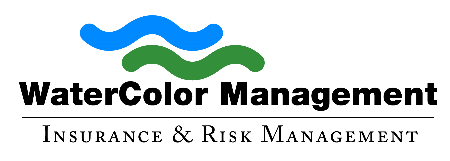
Water treatment businesses manage more than just clean water — they handle systems and substances that carry significant liability. These operations require insurance solutions that are as specialized as the risks they face, ranging from potential contamination and chemical handling to ever-changing environmental regulations.
That’s where a dedicated water treatment program from WaterColor Management makes a measurable difference. For insurance agents, helping clients understand why premiums are what they are — and how to reduce them — starts with having the right answers. This FAQ provides clear, informed responses to help your clients make confident decisions.
FAQ #1: What Factors Determine My Water Treatment Program Insurance Premium?
Premiums are never one-size-fits-all. Insurers evaluate a variety of factors when calculating a liability insurance premium, including:
- Business size and revenue: A company servicing hundreds of commercial accounts will naturally face greater exposure than a small residential outfit.
- Claims history: Past losses, especially related to contamination or property damage, increase future costs.
- Pollution exposure: Operations dealing with hazardous materials or large distribution systems carry a higher environmental risk.
- Regulatory compliance: A track record of violations or lapses in documentation can raise red flags for underwriters.
- Scope of services: Installation, repair, maintenance, and water testing carry distinct risk profiles.
For example, a business that installs reverse osmosis systems for homeowners has different liability concerns than a company that supplies bottled water to hospitals and office parks. The more your clients’ services intersect with health, safety, and property, the more detailed the underwriting process becomes.
FAQ #2: Why Do Premiums Vary So Much Between Water Treatment Businesses?
It’s common for two seemingly similar businesses to receive dramatically different quotes. One reason is operational rigor. A company with strong safety protocols, a clean loss history, and formal employee training may be rewarded with better pricing than one that’s struggled with past claims or lacks standardized processes. It’s not just about “getting a better deal.” It’s about demonstrating to underwriters that the business manages its risks well.
Agents can help their clients see that insurance premiums reflect behavior as much as business type. Helping clients tighten operations can often do more to reduce costs than simply shopping for a new policy.
FAQ #3: How Can I Lower My Liability Premium Without Losing Coverage?
The best way to lower premiums is through effective risk management. As an agent, recommend steps like:
- Employee training on equipment handling, spill response, and safety protocols
- Routine documentation of maintenance schedules and inspection records
- Upgraded equipment with fail-safes or real-time monitoring
- Regular third-party audits to identify and address compliance gaps
WaterColor Management supports its agents and clients with targeted loss control resources that align with underwriting expectations and reduce the frequency and severity of claims — keeping costs down without sacrificing coverage.
FAQ #4: What Coverage Should I Never Cut To Save Money?
Some coverages are too critical to compromise. Water treatment operations should always maintain robust limits on:
- Pollution liability (sudden and gradual): This coverage addresses releases and cleanup costs. For example, in June 2023, a disinfectant pump failure at one Oregon wastewater treatment plant released roughly 500,000 gallons of undisinfected wastewater into the Willamette River.
- Products and completed operations: This coverage protects against third-party bodily injury or property damage arising from installed equipment or completed work.
- Property insurance: This coverage protects buildings, fixed process equipment, and stock (e.g., membranes, resins, chemicals) against covered physical losses.
- Contractual liability: This coverage backs the indemnity obligations your clients assume in agreements with property owners, vendors, and municipalities.
Tempting as it may be to trim coverage to reduce premiums, agents must help clients understand the financial and legal exposure that comes with underinsurance. A single uncovered claim could cost far more than the policy ever would.
FAQ #5: How Can an Insurance Agent Help Me Get the Best Rate?
Great rates start with great placement. As the agent, you connect the client’s story to the right markets. Focus on three things:
- Complete submissions. Provide accurate, detailed applications so underwriters can price quickly and fairly.
- Risk narratives. Highlight safety practices and compliance efforts to show the account manages its risks.
- Targeted market access. Use specialized wholesalers like WaterColor Management to reach the carriers that truly understand niche operations.
With a long-standing reputation in the water industry, WaterColor Management offers programs tailored to common water treatment risks, allowing agents to negotiate smarter and faster on behalf of their clients.
Helping Clients Secure Affordable, Comprehensive Protection
Liability insurance premiums are often a source of stress for water treatment professionals. With the right guidance, they can become a tool for better operations and smarter protection. When agents address premium concerns with facts, strategy, and access to programs like WaterColor Management’s, clients gain peace of mind and protection that fits both their business and their budget.
Contact us to help your water treatment clients find affordable, customized liability insurance solutions.
About WaterColor Management
WaterColor Management has insured the water industry for over 30 years. Our policies include unlimited defense cost coverage in the event of a lawsuit against you. Call us at (855) 929-0824 or email info@watercolormanagement.com for a quick quote for your Water Business Professional, Products/Completed operations, Pollution, and General Liability Insurance.




